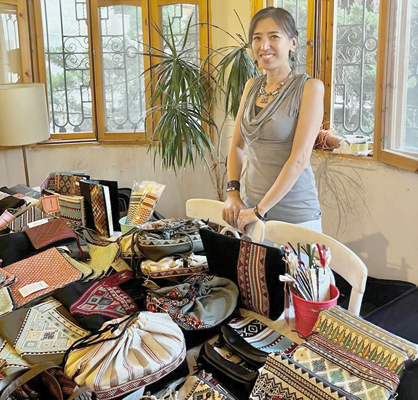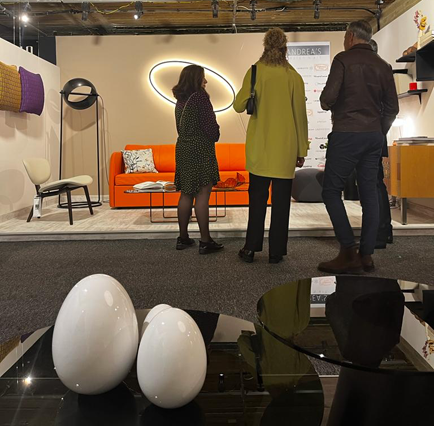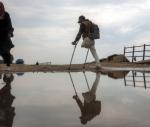You are here
Japanese designer crafts support for vulnerable women in Jordan
By Tara Lumley-Savile - Jun 20,2023 - Last updated at Jun 20,2023

Mei Hayashi, founder of Tribalogy, a non-profit organisation which offers products made by vulnerable Jordanian, Syrian, Palestinian and Iraqi women (Photo by Tara Lumley-Savile)
AMMAN — On Saturday, Jabal Luweibdeh art gallery and tea bar Fann wa Chai hosted the 10-year anniversary celebration of Tribalogy, a non-profit organisation which offers products made by vulnerable Jordanian, Syrian, Palestinian and Iraqi women, primarily based between Zarqa and Zaatari refugee camps.
In 2013, Tribalogy started as a project offering psychosocial workshops for women with the assistance of NGOs based in the two refugee camps.
Originally from Japan, founder Mei Hayashi moved to Jordan in 2008 after having previously worked in the fashion industry in Italy and New York. Her background in design allowed her to advise participants on styling, fabrics and materials, turning the project into the brand that it is today.
“We started with psychosocial workshops using soft skills such as embroidery, soap making and cooking, so that they could get rid of their negative thoughts by using their hands,” the founder explained.
The event at Fann wa Shai consisted of cultural displays from both Japan and Jordan, including Japanese food and drinks, an origami making session and henna application.
She explained the wider benefits of Tribalogy’s workshops on uniting different groups of Jordanian society.
Her inspirations are based on local designs, including Palestinian embroidery and the woven carpets from the Bedouin community.
The anniversary was celebrated on Saturday, June 17, ahead of World Refugee Day on June 20, under the theme “Hope Away From Home”.
The organisation currently works with 25 to 30 women, and they reassess their scope monthly and annually according to the demand for sales.
“This balance is always the hardest part because I end up having to turn down a lot of women, so it’s not always easy to say yes to everyone who wants to participate,” Hayashi said.
Among the attendees were Japanese ambassador to Jordan, Jiro Okuyama, along with six women involved in production and embroidery who made the journey to Amman for the day.
After taking a step back from business operations over the last two years, Hayashi said she provides a helping hand but physically, on a daily and operational basis, the women artisans are now running Tribalogy almost entirely by themselves.
As for Hayashi’s aims for the future of Tribalogy, “I feel like my next step is to make sure this project is fully sustainable,” she said.
Related Articles
AMMAN — The 7th edition of Italian Design Day (IDD) kicked off at the Zara Centre in Amman on Tuesday, offering Jordanians an in
AMMAN — According to Jordanian musician Yazan Zyadat, Jordan’s new musicians are paving the region’s way into the global music scene, with t
AMMAN — Morocco has made it through to the Qatar 2022 World Cup quarter-finals after winning a tense match against Spain earlier this week a

















